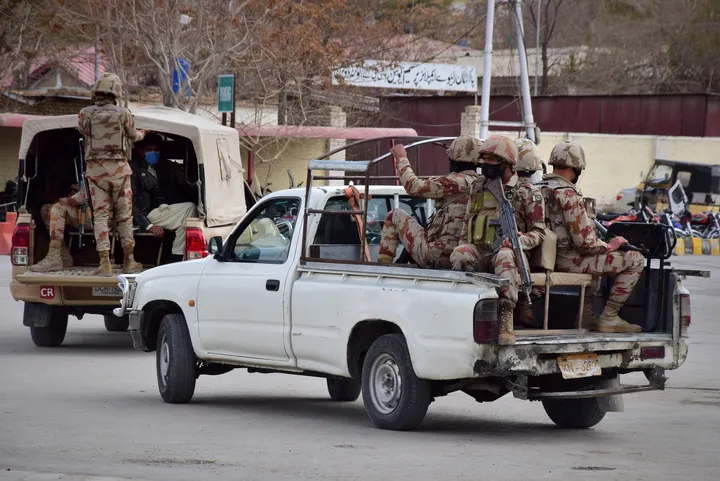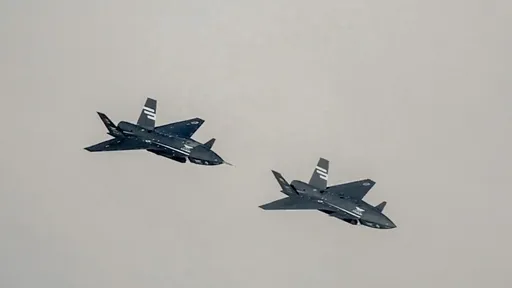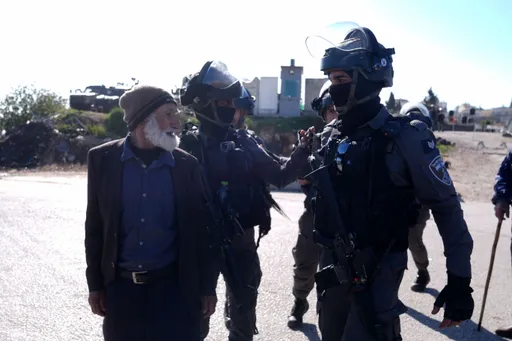Loud explosions ripped through Syria's capital early on Saturday and the sky turned orange as Syrian regime air defence units fired surface-to-air missiles in response to joint airstrikes by the United States, France and Britain.
From a distance, US missiles hitting suburbs of the capital sounded like thunder. Shortly after the one-hour attack ended, vehicles with loudspeakers roamed the streets of Damascus blaring nationalist songs.
"Good souls will not be humiliated," Syria's regime tweeted after the airstrikes began.
Immediately after the attack, Syrian regime TV, broadcasting live from the landmark Omayyad Square, showed crowds of civilians mixing with men in uniform, including vehicles with flags.
US President Donald Trump announced on Friday night that the three allies had launched military strikes to punish Syrian regime leader Bashar al Assad for alleged chemical weapons use and to prevent him from doing it again.
Trump said Washington is prepared to "sustain" pressure on Assad until he ends what the president called a criminal pattern of killing his own people with internationally banned chemical weapons.
The Syrian regime has repeatedly denied any use of banned weapons.
The attack began at 0100 GMT (4am Syrian time) with missiles hitting the eastern suburbs of Damascus, shaking the grounds from a distance.
The sky looked orange over eastern Damascus apparently as a result of fires caused by the missiles hitting Syria. Air defence units fired surface-to-air missiles from different directions toward incoming missiles.
Syrian regime television said the attacks targeted a scientific research centre in Barzeh, near Damascus, and an army depot near Homs.
"One time shot"
Syrian regime TV called the attacks a "blatant violation of international law and shows contempt for international legitimacy."
US Defense Secretary James Mattis said there were no reports of US losses during the initial airstrikes.
"Right now this is a one-time shot," he said but did not rule out further attacks. He said the airstrikes were launched against several sites that helped provide Assad's ability to create chemical weapons.
Britain's defence ministry said that while the effectiveness of the strike is still being analysed, "initial indications are that the precision of the Storm Shadow weapons and meticulous target planning have resulted in a successful attack."
The Syria attack drew support from the European Union, Germany, Israel and other allies while British Prime Minister Theresa May said reports indicate the Syrian regime used a barrel bomb to deliver the chemicals used in an attack on Douma. She said the use of force was "right and legal" in this case.
May describes the attack as neither "about intervening in a civil war" nor "about regime change" but a limited and targeted strike that "does not further escalate tensions in the region" and does everything possible to prevent civilian casualties.
"We would have preferred an alternative path. But on this occasion there is none," May said.
The decision to strike, after days of deliberations, marked Trump's second order to attack Syria; he authorised a barrage of Tomahawk cruise missiles to hit a single Syrian regime airfield in April 2017 in retaliation for Assad's use of sarin gas against civilians.
Trump chastised Syria's two main allies, Russia and Iran, for their roles in supporting "murderous dictators," and noted that Russian President Vladimir Putin had guaranteed a 2013 international agreement for Assad to get rid of all of his chemical weapons.
He called on Moscow to change course and join the West in seeking a more responsible regime in Damascus.
Russia warns of consequences
Putin reaffirmed Russia's view that a purported chemical attack in the Syrian town of Douma that prompted the strike was a fake. Putin added that Russian military experts who inspected Douma found no trace of the attack. He criticized the US and its allies for launching the strike without waiting for inspectors from the international chemical weapons watchdog to visit the area.
Russia's Foreign Ministry said Syria has been attacked just as it had a chance for peace.
"First the 'Arab spring' tested the Syrian people, then Islamic State (Daesh), now smart American rockets. The capital of a sovereign government, trying for years to survive under terrorist aggression, has been attacked," foreign ministry spokeswoman Maria Zakharova wrote on Facebook.
Syrian opposition leader Nasra al Hariri called for an end to what he described as all attacks against civilians by the Syrian regime and its allies, whether using chemical or conventional weapons.
"Maybe the regime will not use chemical weapons again, but it will not hesitate to use weapons the international community has allowed it, such as barrel bombs and cluster bombs," Hariri, head of the main Syrian opposition bloc, said in a tweet.
The head of NATO expressed his support for the strikes.
"I support the actions taken by the United States, the United Kingdom and France... This will reduce the regime's ability to further attack the people of Syria with chemical weapons," Secretary-General Jens Stoltenberg said in a statement.
UN Secretary-General Antonio Guterres, however, called for a restraint.
“I urge all member states to show restraint in these dangerous circumstances and to avoid any acts that could escalate the situation and worsen the suffering of the Syrian people,” Guterres says in a statement.























